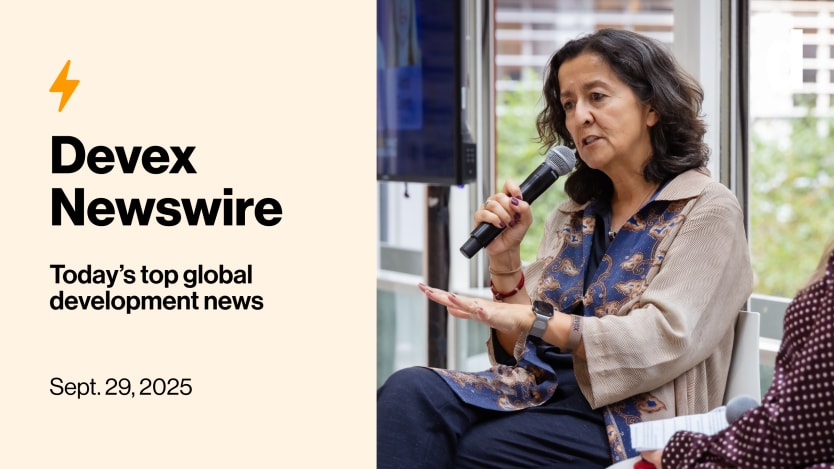Presented by International Monetary Fund

Seemingly overnight, Save the Children lost a third of its annual global program budget while FHI 360 lost half its revenue as a result of the Trump administration’s foreign aid liquidation. They reveal how they’re managing.
Also in today’s edition: The Trump administration racks up another foreign aid win thanks to the Supreme Court.
+ Join us tomorrow: We’re hosting a Devex Career event focused on strengthening CVs and job applications during career transitions. Save your spot now. To gain access to this and all digital events, advice guides, and job board, sign up for a Devex Career Account membership and get an exclusive 50% discount on our regular rate, but hurry — this offer ends at the close of the month.
Lessons in crisis management
The U.S. aid purge forced many organizations to go into fight or flight mode. Save the Children and FHI 360 chose to fight, learning important lessons along the way.
“Our biggest priority in that initial month was trying to figure out what is the lifesaving work that is terminated and that we have to continue so that no children die on our watch in the immediate term? So that is very clarifying when you have that front and center, because everything else almost falls away,” Janti Soeripto, CEO of Save the Children US, told me at Devex Impact House on the sidelines of the 80th U.N. General Assembly.
Soeripto added that while Save the Children “made loads of mistakes” as it navigated those dark early days, “I think what we did well is we told our staff early, we’re going to make lots of mistakes, and we’re going to own up to them,” she said. “So we overcommunicated to staff all the time, even if it meant that … we have to say we don’t know.”
Also at Devex Impact House, FHI 360 CEO Tessie San Martin told my colleague Elissa Miolene that she’s chosen to see the silver lining amid the losses.
“We have lost, over the course of this year, in a few months, half our revenue,” she said. “But the good news is that leaves half our revenue, right? And so I’m going to take that as a positive.”
Both San Martin and Soeripto believe it’s time to move forward, and not look back.
“Now I think we’re getting to a phase where a lot of that — yes, painful and sometimes heartbreaking though it was — we’re seeing not only green shoots of recovery, but we’re also seeing a path towards rebound and also a path towards reform,” Soeripto said.
For Soeripto, reform means more involvement from the private sector. For San Martin, it’s adopting artificial intelligence. For both, it’s about accepting reality.
“In this moment of scarcity and crisis, this is no time to be timid,” San Martin told us. “This is a time to be bold and to lean into new and at times, perhaps riskier ways of working, but we need to be leaning into it now, because the world needs for us to change.”
Read: Save the Children US CEO details how they navigated the budget crash (Pro)
Read more: How FHI 360 has adapted to a year of chaos (Pro)
+ Elevate your development work. Begin your 15-day free trial of Devex Pro and instantly access our comprehensive suite of resources: expert analysis, insider briefings, funding databases, and curated event listings. Check out all the exclusive content available to you.
Down the drain
Another piece of advice from Soeripto: Assume nothing is coming back. That way, if any cuts are restored, “it’s a cherry on top.”
It doesn’t look like we’re going to be feasting on cherries if the latest twist in the Trump administration’s foreign aid fight is any indication.
On Friday, the Supreme Court ruled that the administration does not have to spend $10.5 billion in foreign aid funding set to expire on Sept. 30, overturning a lower court order.
The administration had said it intended to obligate about $6.5 billion of an outstanding $10.5 billion, while requesting from Congress that it claw back the remaining $4 billion through a “pocket” rescission timed to leave little time for congressional review before the end of the fiscal year, my colleague Adva Saldinger writes.
It’s a big win in the White House’s efforts to commandeer spending power normally wielded by Congress.
“This result further erodes separation of powers principles that are fundamental to our constitutional order,” Nicholas Sansone, attorney with Public Citizen Litigation Group, who represents the AIDS Vaccine Advocacy Coalition, one of the plaintiffs, said in a statement. “It will also have a grave humanitarian impact.”
Meanwhile, the court’s conservative majority said the president’s flexibility to engage in foreign affairs outweighed “the potential harm” faced by aid recipients, though this verdict is not the final outcome.
Read: Supreme Court rules that Trump administration can let foreign aid expire
Spare change
Last week’s U.N. General Assembly exposed the world body’s twin crises of budget cuts and questionable relevance. That’s also led to a debate over austerity versus reform, the subject of a Devex Impact House panel.
Ayaka Suzuki, director of strategic planning in the U.N. Secretary-General’s office, said austerity measures are separate from the UN80 Initiative — billed as a once-in-a-generation overhaul ahead of the organization’s 80th anniversary.
“We are having a cash problem. … UN80, that is about making us more effective, better able to deliver on our mandate,” she argued. The reforms aim to overcome fragmentation, duplication, and overlaps, with Suzuki describing the process as “the most open and consultative reform process” in her 30 years at the organization.
But Eugene Chen, senior fellow at U.N. University, argued that cutting programs to accommodate the cash crunch weakens the system’s ability to deliver just as global crises proliferate. “Shrinking the overall budget is not the solution,” Chen said.
Read: UN faces ‘austerity vs. reform’ dilemma as funding crisis deepens
ICYMI: Top UN official defends reform agenda as genuine, despite skepticism (Pro)
Also check out: Can the UN really reform itself? (Pro)
Get to the point
Many Americans don’t think decades of aid have made a dent in global poverty. It’s up to the development community to flip the script on such misconceptions, Michelle Nunn, CEO of CARE USA, told us at Devex Impact House.
“Somebody from the [Trump] administration said to a group of us, ‘If you can’t explain what you’re doing to my mother and her Sunday school class, then you know, you have a problem,’” she said. “And I think we have to take that seriously, and I think we have an obligation to invite the American public in and to broaden the constituency of people who care about global development.”
“I think most people think that we have actually increased the number of people that are living in poverty around the world over the last decades,” she added. “They don’t recognize that we’ve decreased maternal mortality, child mortality, that there have been a host of real, important points of progress.”
She said that CARE, like many other INGOs, had been hammered by aid cuts, losing 1,500 staff and cutting core operating costs by 30%. But she said it was important not to accept the message emerging from the Trump administration.
Read: Time to think again about how we talk about aid, CARE CEO says (Pro)
ICYMI: Why don't Americans understand aid, and what do we do about it? (Pro)
Real-world consequences
“What we saw was exactly what we expected, sadly — the cruelty, the immorality, the blunt instrument effect of cutting foreign assistance on the scale that it was cut.”
— Abby Maxman, CEO, Oxfam AmericaMaxman recently visited the Democratic Republic of Congo, where 70% of humanitarian assistance used to come from the U.S. There, she not only saw the impact of those cuts firsthand, but she also witnessed the confusion among communities.
She told a Devex Impact House audience that the local partners Oxfam works with were struggling to explain to those communities why funding dried up overnight. “So even our local partners, the risks to them have increased dramatically. They were scared. They talked about all of the challenging harassment that they were receiving from multiple ends, all because of this set of cruel actions, without warning and without reason, by the United States government.”
Read: Oxfam head says ‘cruel’ US cuts were ‘without warning and without reason’
+ Check out our UNGA80 focus page for all coverage of the General Assembly, and don’t miss our special edition newsletter arriving soon in your inbox!
In other news
Médecins Sans Frontières has suspended its work in Gaza amid escalating Israeli military strikes that have made it difficult to treat patients safely. [The Independent]
The Open Society Foundations spoke out against the Trump administration’s plan to have the organization investigated, calling the move a politically motivated attack on civil society. [The Guardian]
On Tuesday, the U.N. will hold a high-level conference on the situation of the Rohingya and other minorities in Myanmar; however, no representative from the group will be in attendance. [The New York Times]
Sign up to Newswire for an inside look at the biggest stories in global development.








